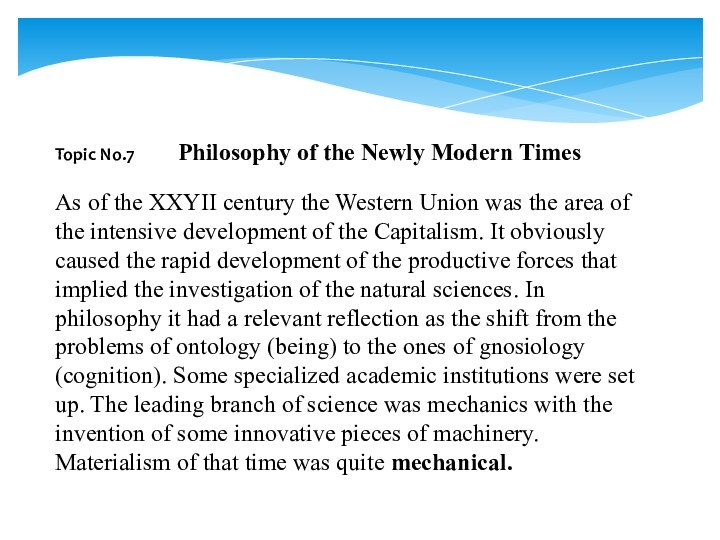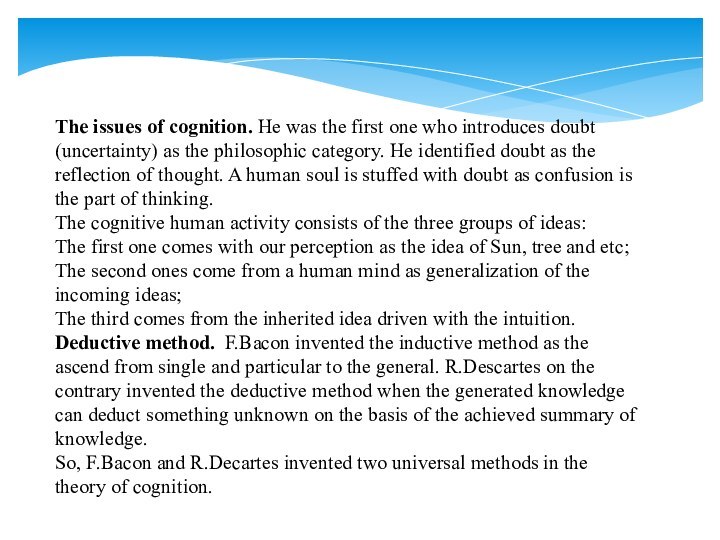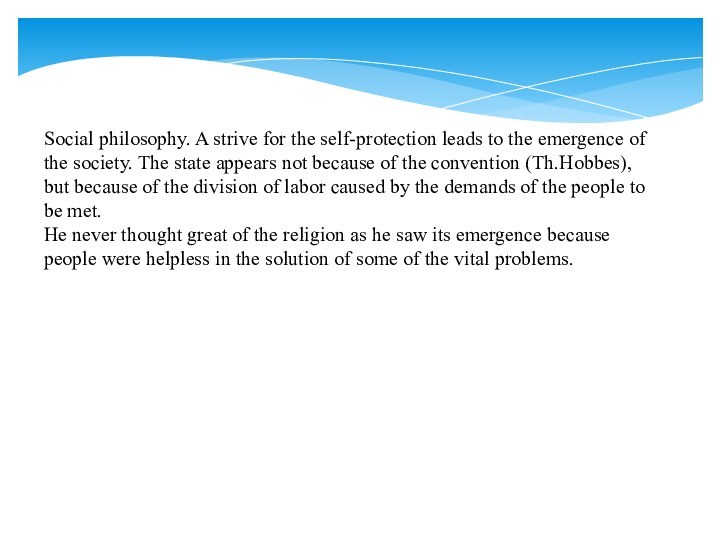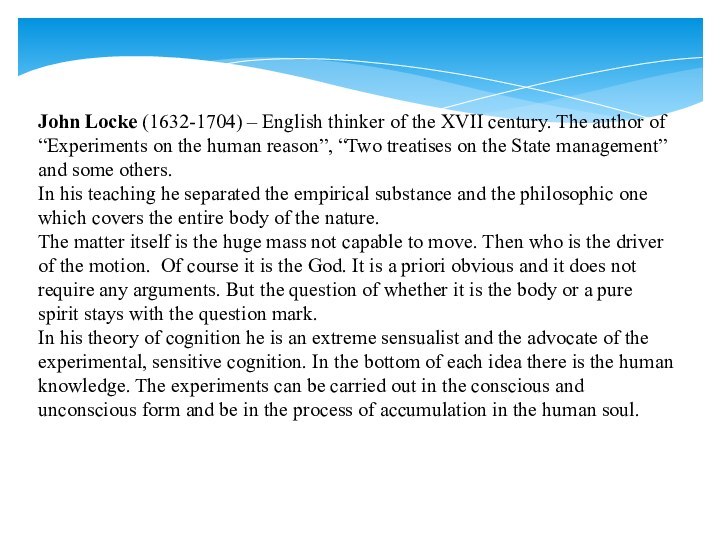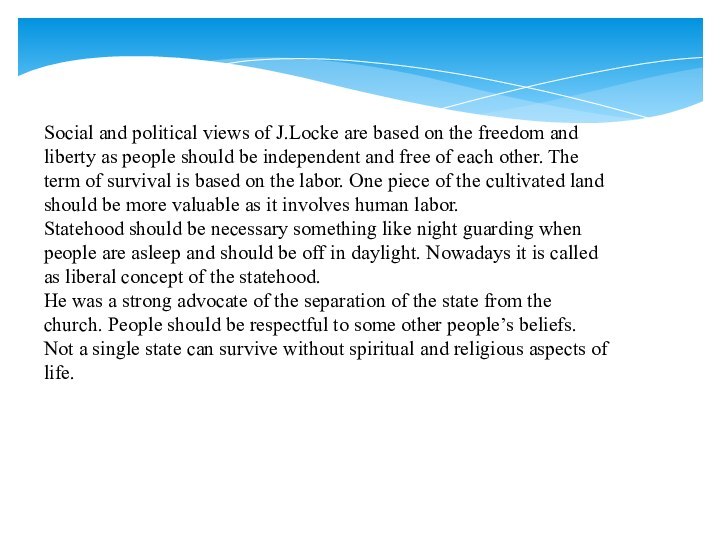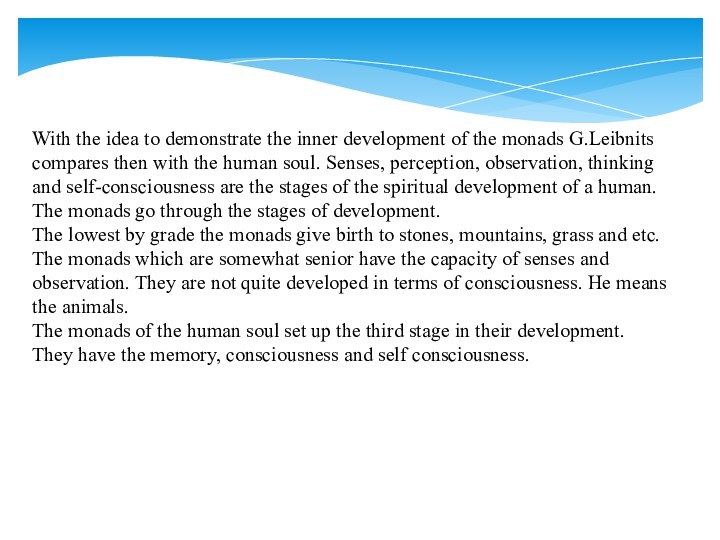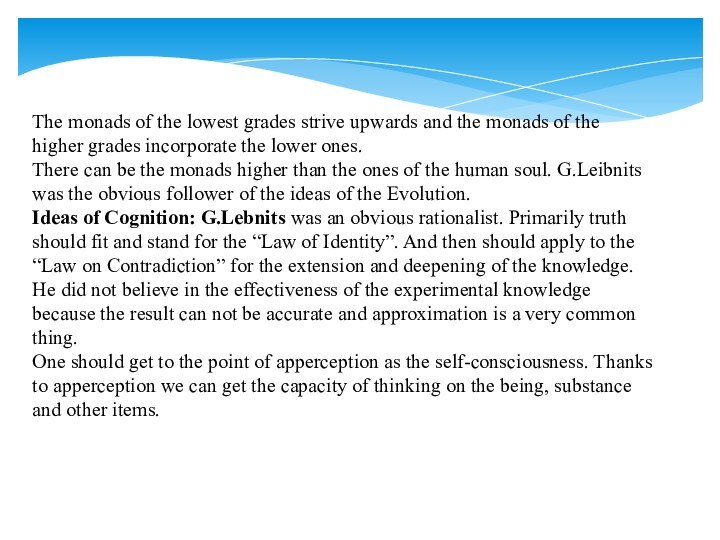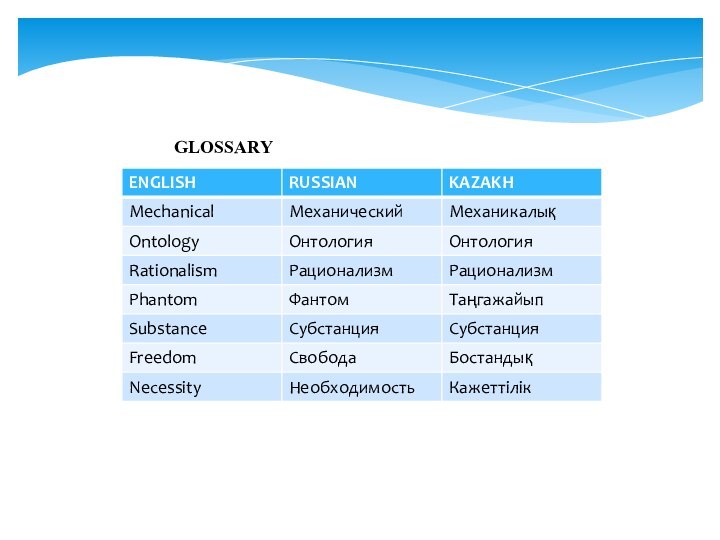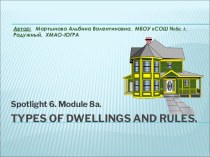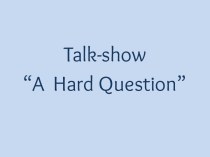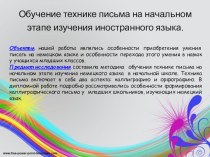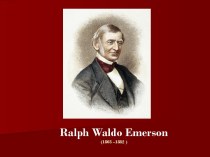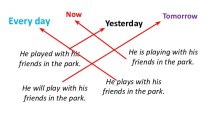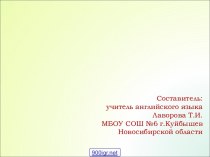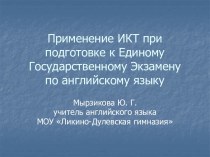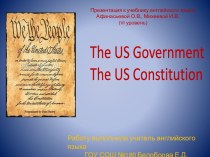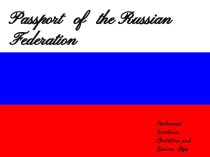Слайд 2
It should also be mentioned that the influence

of religion was still there, though the conflict of
interests with the discoveries in the natural sciences was obvious. Religious fanatism was scaling down with the new trend like deism (dues, - lat., - god) with the presumption that the God having once created this world does not interfere in its further development.
As for the natural sciences there were two trends which were somewhat different = empirics and rationalism that proved the confidence of human in discovering the secrets and mysteries of the nature.
Francis Bacon was the founder of the Philosophy of the newly Modern Times.(New Organon) There are three areas of the subject matter of Philosophy = God, Nature and a Human. Science as the process of cognition is targeted at reproduction of the human resources. The achieved knowledge is divided into the ones that bring some material value and the ones that can contribute to the development of such knowledge.
In cognition he thinks that there are problems that should be eliminated. He calls them as “idols” or “phantoms”.
Слайд 3
“Idols in the Generic sense” (Latin – idola
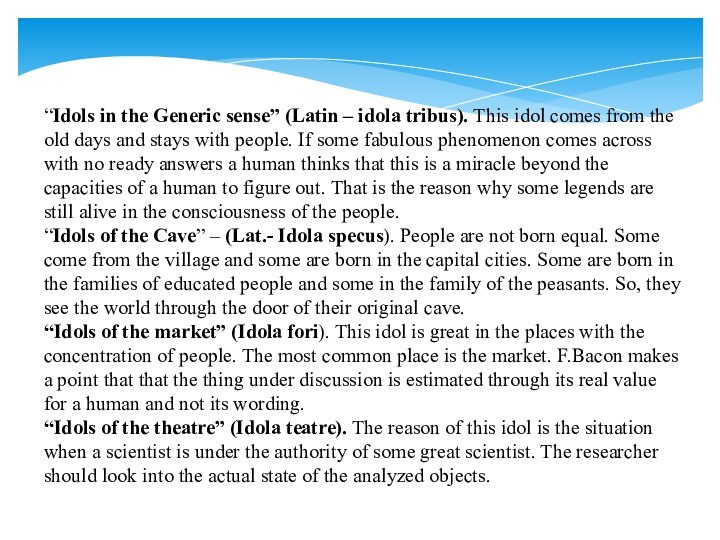
tribus). This idol comes from the old days and
stays with people. If some fabulous phenomenon comes across with no ready answers a human thinks that this is a miracle beyond the capacities of a human to figure out. That is the reason why some legends are still alive in the consciousness of the people.
“Idols of the Cave” – (Lat.- Idola specus). People are not born equal. Some come from the village and some are born in the capital cities. Some are born in the families of educated people and some in the family of the peasants. So, they see the world through the door of their original cave.
“Idols of the market” (Idola fori). This idol is great in the places with the concentration of people. The most common place is the market. F.Bacon makes a point that that the thing under discussion is estimated through its real value for a human and not its wording.
“Idols of the theatre” (Idola teatre). The reason of this idol is the situation when a scientist is under the authority of some great scientist. The researcher should look into the actual state of the analyzed objects.
Слайд 4
F.Bacon is the creator of the experimental-inductive method
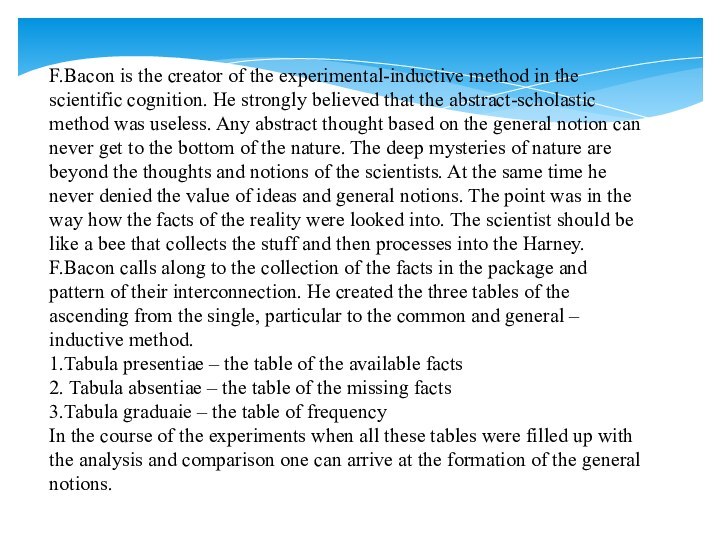
in the scientific cognition. He strongly believed that the
abstract-scholastic method was useless. Any abstract thought based on the general notion can never get to the bottom of the nature. The deep mysteries of nature are beyond the thoughts and notions of the scientists. At the same time he never denied the value of ideas and general notions. The point was in the way how the facts of the reality were looked into. The scientist should be like a bee that collects the stuff and then processes into the Harney.
F.Bacon calls along to the collection of the facts in the package and pattern of their interconnection. He created the three tables of the ascending from the single, particular to the common and general – inductive method.
1.Tabula presentiae – the table of the available facts
2. Tabula absentiae – the table of the missing facts
3.Tabula graduaie – the table of frequency
In the course of the experiments when all these tables were filled up with the analysis and comparison one can arrive at the formation of the general notions.
Слайд 5
Rene Descartes (1596-1650) was one of the outstanding

scientists of his time. He was very well educated
and never cared about politics. Being a bright mathematician, mechanic, psychologist he tried and succeeded to adjust to his philosophic contemplations.
His main creations were “On the Method”, “Diaoptrics”, “Geometry” and some others.
In his ontological views (teaching on being) he followed the dualistic approach accepting:
The material substance with the attribute as extent in terms of length;
Spirit with the key attribute as thinking.
This dualistic approach created some complications in the final construction how these two material and spiritual substances can be fused. He explains this as the will of the God. At the same time the God having created everything on the earth leaves it in peace and nature is developed according to its own regulations.
He was the first pioneering scientist who outlined the unconditioned reflex as the impulse for the outside impact. Human mind is the universal vehicle with the sensible speech that divorces a human from the beasts.
Слайд 6
The issues of cognition. He was the first
one who introduces doubt (uncertainty) as the philosophic category.
He identified doubt as the reflection of thought. A human soul is stuffed with doubt as confusion is the part of thinking.
The cognitive human activity consists of the three groups of ideas:
The first one comes with our perception as the idea of Sun, tree and etc;
The second ones come from a human mind as generalization of the incoming ideas;
The third comes from the inherited idea driven with the intuition.
Deductive method. F.Bacon invented the inductive method as the ascend from single and particular to the general. R.Descartes on the contrary invented the deductive method when the generated knowledge can deduct something unknown on the basis of the achieved summary of knowledge.
So, F.Bacon and R.Decartes invented two universal methods in the theory of cognition.
Слайд 7
Thomas Hobbes graduated from Oxford that tells a
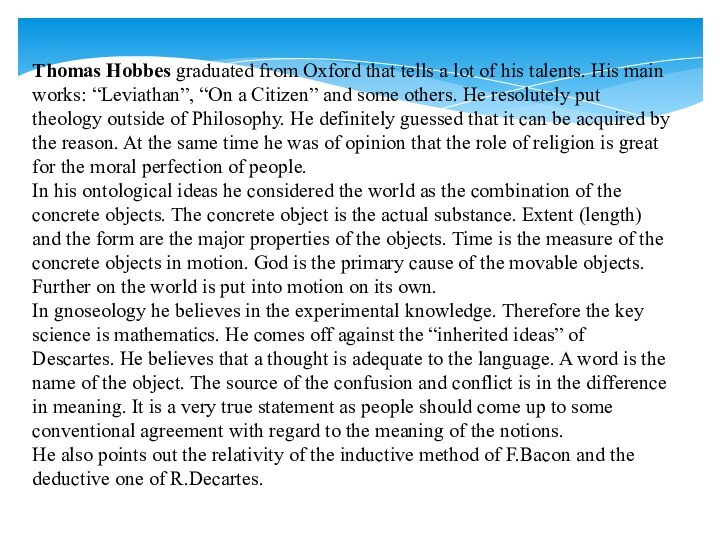
lot of his talents. His main works: “Leviathan”, “On
a Citizen” and some others. He resolutely put theology outside of Philosophy. He definitely guessed that it can be acquired by the reason. At the same time he was of opinion that the role of religion is great for the moral perfection of people.
In his ontological ideas he considered the world as the combination of the concrete objects. The concrete object is the actual substance. Extent (length) and the form are the major properties of the objects. Time is the measure of the concrete objects in motion. God is the primary cause of the movable objects. Further on the world is put into motion on its own.
In gnoseology he believes in the experimental knowledge. Therefore the key science is mathematics. He comes off against the “inherited ideas” of Descartes. He believes that a thought is adequate to the language. A word is the name of the object. The source of the confusion and conflict is in the difference in meaning. It is a very true statement as people should come up to some conventional agreement with regard to the meaning of the notions.
He also points out the relativity of the inductive method of F.Bacon and the deductive one of R.Decartes.
Слайд 8
The problem of a human is treated along
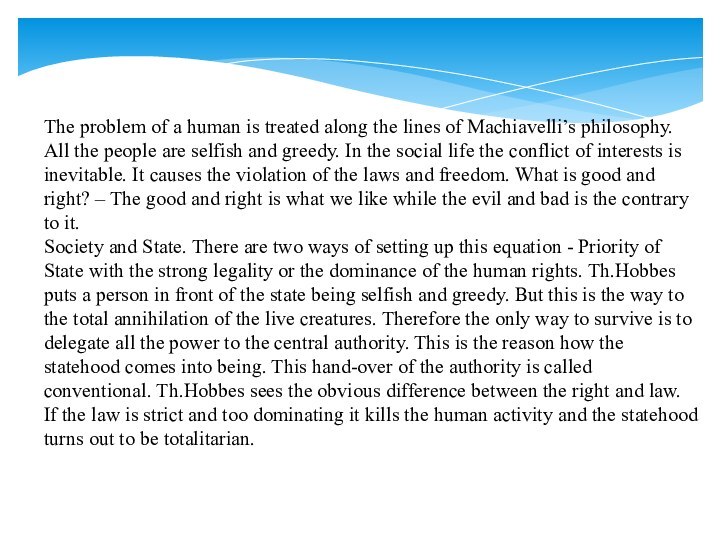
the lines of Machiavelli’s philosophy. All the people are
selfish and greedy. In the social life the conflict of interests is inevitable. It causes the violation of the laws and freedom. What is good and right? – The good and right is what we like while the evil and bad is the contrary to it.
Society and State. There are two ways of setting up this equation - Priority of State with the strong legality or the dominance of the human rights. Th.Hobbes puts a person in front of the state being selfish and greedy. But this is the way to the total annihilation of the live creatures. Therefore the only way to survive is to delegate all the power to the central authority. This is the reason how the statehood comes into being. This hand-over of the authority is called conventional. Th.Hobbes sees the obvious difference between the right and law. If the law is strict and too dominating it kills the human activity and the statehood turns out to be totalitarian.
Слайд 9
Barukh (Benedict) Spinoza was one of the greatest

philosophers of his time with the contribution of his
papers like “Political treatise”, “Ethics” and some others.
In his ontology Spinoza considers the God as the last instance of the world. So, the God is not the creator of spirit as it can be absorbed exclusively by reason. At the same time he makes a point that the God is the direct reason of the world. In other words the God which is equal to the Nature by its essence is the substance of this world. So, God, Nature and Substance are the integral entity. The Nature is the “cause sui” – self-producing cause. There are two categories of Nature – producing nature (natura naturans), and produced nature (natura naturata). The former can be acquired through the intellectual intuition and the latter through the perceptive reflection of a human.
All the concrete objects are treated as the moduses of one and the same substance. The moduses emerge, change and disappear. The other point is that every object is unique with the specific properties.
Слайд 10
The substance has some attributes like extent(length) and
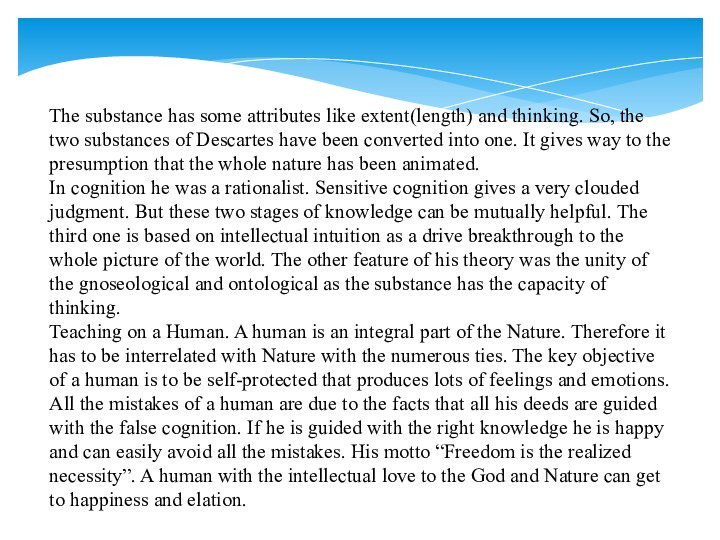
thinking. So, the two substances of Descartes have been
converted into one. It gives way to the presumption that the whole nature has been animated.
In cognition he was a rationalist. Sensitive cognition gives a very clouded judgment. But these two stages of knowledge can be mutually helpful. The third one is based on intellectual intuition as a drive breakthrough to the whole picture of the world. The other feature of his theory was the unity of the gnoseological and ontological as the substance has the capacity of thinking.
Teaching on a Human. A human is an integral part of the Nature. Therefore it has to be interrelated with Nature with the numerous ties. The key objective of a human is to be self-protected that produces lots of feelings and emotions. All the mistakes of a human are due to the facts that all his deeds are guided with the false cognition. If he is guided with the right knowledge he is happy and can easily avoid all the mistakes. His motto “Freedom is the realized necessity”. A human with the intellectual love to the God and Nature can get to happiness and elation.
Слайд 11
Social philosophy. A strive for the self-protection leads
to the emergence of the society. The state appears
not because of the convention (Th.Hobbes), but because of the division of labor caused by the demands of the people to be met.
He never thought great of the religion as he saw its emergence because people were helpless in the solution of some of the vital problems.
Слайд 12
John Locke (1632-1704) – English thinker of the
XVII century. The author of “Experiments on the human
reason”, “Two treatises on the State management” and some others.
In his teaching he separated the empirical substance and the philosophic one which covers the entire body of the nature.
The matter itself is the huge mass not capable to move. Then who is the driver of the motion. Of course it is the God. It is a priori obvious and it does not require any arguments. But the question of whether it is the body or a pure spirit stays with the question mark.
In his theory of cognition he is an extreme sensualist and the advocate of the experimental, sensitive cognition. In the bottom of each idea there is the human knowledge. The experiments can be carried out in the conscious and unconscious form and be in the process of accumulation in the human soul.
Слайд 13
He is very critical of the supposition of
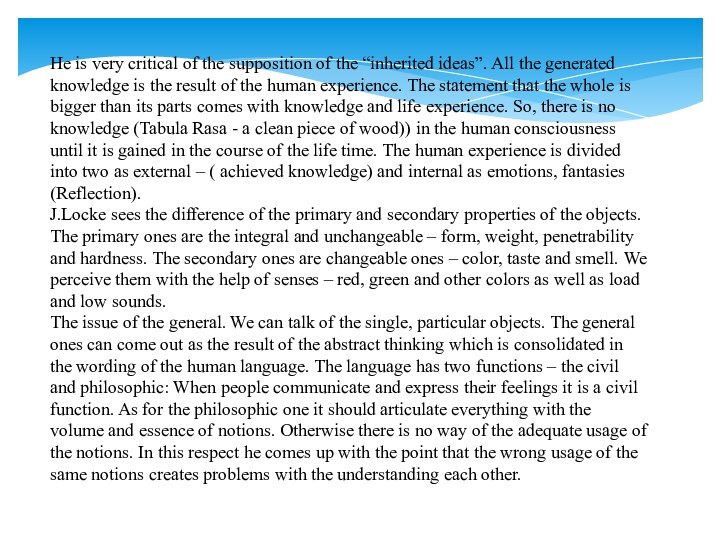
the “inherited ideas”. All the generated knowledge is the
result of the human experience. The statement that the whole is bigger than its parts comes with knowledge and life experience. So, there is no knowledge (Tabula Rasa - a clean piece of wood)) in the human consciousness until it is gained in the course of the life time. The human experience is divided into two as external – ( achieved knowledge) and internal as emotions, fantasies (Reflection).
J.Locke sees the difference of the primary and secondary properties of the objects. The primary ones are the integral and unchangeable – form, weight, penetrability and hardness. The secondary ones are changeable ones – color, taste and smell. We perceive them with the help of senses – red, green and other colors as well as load and low sounds.
The issue of the general. We can talk of the single, particular objects. The general ones can come out as the result of the abstract thinking which is consolidated in the wording of the human language. The language has two functions – the civil and philosophic: When people communicate and express their feelings it is a civil function. As for the philosophic one it should articulate everything with the volume and essence of notions. Otherwise there is no way of the adequate usage of the notions. In this respect he comes up with the point that the wrong usage of the same notions creates problems with the understanding each other.
Слайд 14
Social and political views of J.Locke are based
on the freedom and liberty as people should be
independent and free of each other. The term of survival is based on the labor. One piece of the cultivated land should be more valuable as it involves human labor.
Statehood should be necessary something like night guarding when people are asleep and should be off in daylight. Nowadays it is called as liberal concept of the statehood.
He was a strong advocate of the separation of the state from the church. People should be respectful to some other people’s beliefs. Not a single state can survive without spiritual and religious aspects of life.
Слайд 15
Gottfried Leibnits (1646-1716) – outstanding German philosopher and
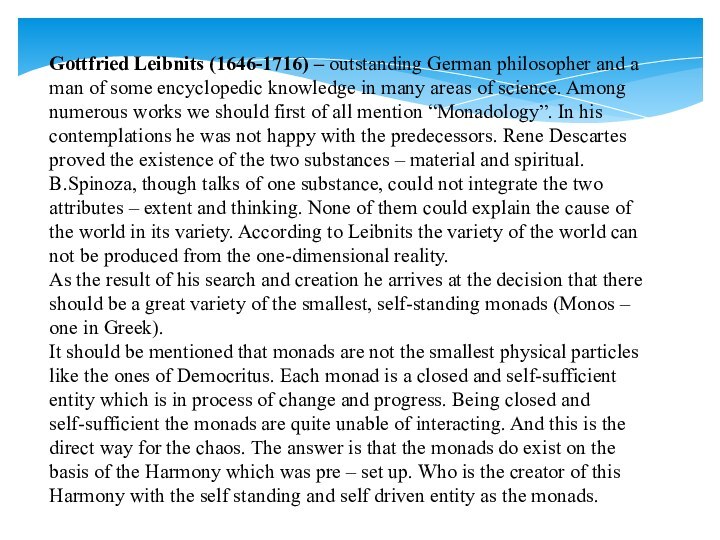
a man of some encyclopedic knowledge in many areas
of science. Among numerous works we should first of all mention “Monadology”. In his contemplations he was not happy with the predecessors. Rene Descartes proved the existence of the two substances – material and spiritual. B.Spinoza, though talks of one substance, could not integrate the two attributes – extent and thinking. None of them could explain the cause of the world in its variety. According to Leibnits the variety of the world can not be produced from the one-dimensional reality.
As the result of his search and creation he arrives at the decision that there should be a great variety of the smallest, self-standing monads (Monos – one in Greek).
It should be mentioned that monads are not the smallest physical particles like the ones of Democritus. Each monad is a closed and self-sufficient entity which is in process of change and progress. Being closed and self-sufficient the monads are quite unable of interacting. And this is the direct way for the chaos. The answer is that the monads do exist on the basis of the Harmony which was pre – set up. Who is the creator of this Harmony with the self standing and self driven entity as the monads.
Слайд 16
With the idea to demonstrate the inner development
of the monads G.Leibnits compares then with the human
soul. Senses, perception, observation, thinking and self-consciousness are the stages of the spiritual development of a human. The monads go through the stages of development.
The lowest by grade the monads give birth to stones, mountains, grass and etc.
The monads which are somewhat senior have the capacity of senses and observation. They are not quite developed in terms of consciousness. He means the animals.
The monads of the human soul set up the third stage in their development. They have the memory, consciousness and self consciousness.
Слайд 17
The monads of the lowest grades strive upwards
and the monads of the higher grades incorporate the
lower ones.
There can be the monads higher than the ones of the human soul. G.Leibnits was the obvious follower of the ideas of the Evolution.
Ideas of Cognition: G.Lebnits was an obvious rationalist. Primarily truth should fit and stand for the “Law of Identity”. And then should apply to the “Law on Contradiction” for the extension and deepening of the knowledge.
He did not believe in the effectiveness of the experimental knowledge because the result can not be accurate and approximation is a very common thing.
One should get to the point of apperception as the self-consciousness. Thanks to apperception we can get the capacity of thinking on the being, substance and other items.
Слайд 18
Summary of the generated ideas in the epoch
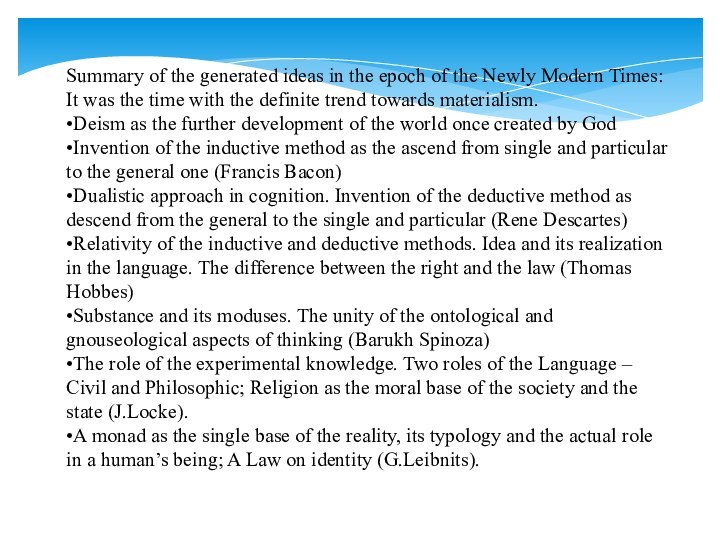
of the Newly Modern Times:
It was the time with
the definite trend towards materialism.
•Deism as the further development of the world once created by God
•Invention of the inductive method as the ascend from single and particular to the general one (Francis Bacon)
•Dualistic approach in cognition. Invention of the deductive method as descend from the general to the single and particular (Rene Descartes)
•Relativity of the inductive and deductive methods. Idea and its realization in the language. The difference between the right and the law (Thomas Hobbes)
•Substance and its moduses. The unity of the ontological and gnouseological aspects of thinking (Barukh Spinoza)
•The role of the experimental knowledge. Two roles of the Language – Civil and Philosophic; Religion as the moral base of the society and the state (J.Locke).
•A monad as the single base of the reality, its typology and the actual role in a human’s being; A Law on identity (G.Leibnits).
